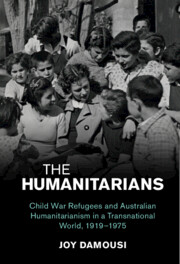 The Humanitarians
The Humanitarians Book contents
- The Humanitarians
- Studies in the Social and Cultural History of Modern Warfare
- The Humanitarians
- Copyright page
- Dedication
- Contents
- Acknowledgements
- Abbreviations
- Introduction
- Part I Saving
- Part II Evacuating
- 3 Humanitarianism and Child Refugee Sponsorship
- 4 Campaigns to Evacuate Jewish Child Refugees
- 5 British Child Evacuees to Australia
- 6 Aileen Fitzpatrick and Reuniting Greek Families Separated by War
- Part III Assimilating and Adopting
- Conclusion
- Select Bibliography
- Index
6 - Aileen Fitzpatrick and Reuniting Greek Families Separated by War
from Part II - Evacuating
Published online by Cambridge University Press: 28 July 2022
- The Humanitarians
- Studies in the Social and Cultural History of Modern Warfare
- The Humanitarians
- Copyright page
- Dedication
- Contents
- Acknowledgements
- Abbreviations
- Introduction
- Part I Saving
- Part II Evacuating
- 3 Humanitarianism and Child Refugee Sponsorship
- 4 Campaigns to Evacuate Jewish Child Refugees
- 5 British Child Evacuees to Australia
- 6 Aileen Fitzpatrick and Reuniting Greek Families Separated by War
- Part III Assimilating and Adopting
- Conclusion
- Select Bibliography
- Index
Summary
The evacuation of 25,000 children from Northern Greece at the height of the Greek Civil War has a direct connection to Australia through the efforts of humanitarian Aileen Fitzpatrick, as discussed in Chapter 6. Drawing on arguments about notions of the family and the need for its continuation, Fitzpatrick was able to reunite children in neighbouring communist countries with their parents who had migrated to Australia. Several themes of significance run through Fitzpatrick’s efforts. Her argument for the unification of families echoed and endorsed the political and cultural discourse of the day, that the conventional family unit – the cornerstone of 1950s Australia – defined assimilation of migrants and upheld the ‘Australian way of life’. She hoped that in promoting an ideal of the white nuclear family, her appeal drawing together an emotional community would extend cross-culturally and would be supported in Eastern Bloc countries to allow children to be repatriated with their families. Saving the conventional family meant restoring the democratic way of life that she believed was defined by a 1950s understanding of the family. A focus on Fitzpatrick’s activities allows for women’s role as key players in international diplomacy and global movements to be highlighted, in ways that have not been recognised in accounts that focus on policy, the state and the role of diplomats.
- Type
- Chapter
- Information
- The HumanitariansChild War Refugees and Australian Humanitarianism in a Transnational World, 1919–1975, pp. 168 - 192Publisher: Cambridge University PressPrint publication year: 2022


